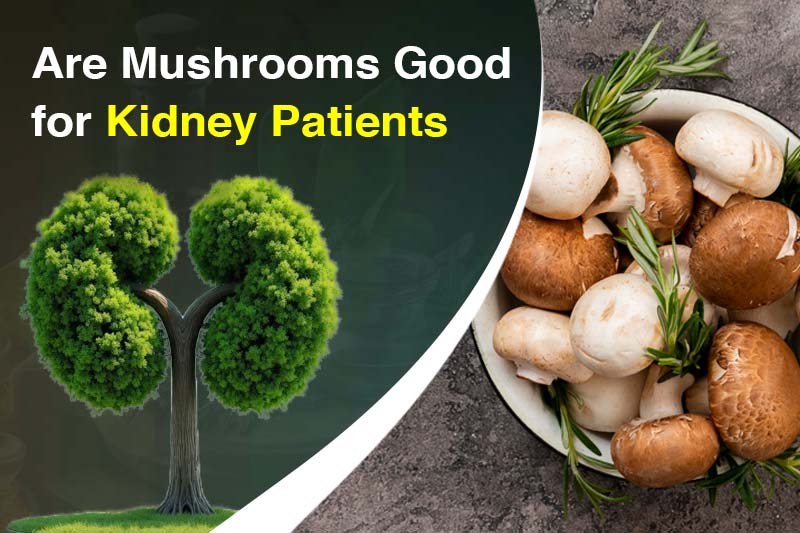
 August 25, 2025
August 25, 2025
Food can sometimes feel like a confusing maze for kidney patients, doesn’t it? Today, I want to talk about a food commonly enjoyed, but that may cause some wonder for kidney patients: mushrooms. Are mushrooms good for kidney patients? Let's find out!
Before we get into mushrooms specifically, just a few lines about why diet is so important when it comes to kidney health. Our kidneys are amazing little organs; they filter waste, handle electrolytes, maintain fluid balance, and help manage blood pressure, among many other important roles. But when kidneys become compromised (as in chronic kidney disease or as a result of injury), they need some help, especially from what we eat, as some nutrients can accumulate when the kidneys are unable to filter them sufficiently. Managing potassium, phosphorus, and sodium intake is often crucial. Since mushrooms have their own nutritional profile, it's helpful to understand how they can fit into a kidney-friendly diet.
Mushrooms are not technically vegetables; they belong to the fungi family. But in the kitchen, we treat them like veggies because they add so much flavor and texture to meals. Nutritionally, mushrooms are low in calories, fat-free, cholesterol-free, and packed with some essential nutrients.
Here’s a quick snapshot of what mushrooms bring to the table:
Yes, but in moderation. You must check out the potassium and phosphorus levels of the specific mushroom you plan to eat. Let’s unpack these details a little more.
Potassium is a mineral regulated by the kidneys. With declining kidney function, potassium may build up in the blood. This can pose a risk of heart complications in kidney patients. As a result, many kidney patients are told to be mindful of their potassium intake. The good news is that the most common mushrooms (i.e., white button mushrooms, cremini, and portobello) are relatively lower in potassium than other vegetables. To put it in perspective, one cup of sliced raw white mushrooms has about 223 mg of potassium. That is lower than a banana (~422 mg) and lower than a medium potato (~610 mg). So, it seems that mushrooms in renal diet can be a possibility, but remember, portion control is still important, and your healthcare provider or dietitian will help you determine how much potassium is best for you.
Phosphorus is another mineral to watch with kidney issues. It’s found in many protein-rich foods, and too much phosphorus can cause bone and heart problems in kidney disease. Mushrooms do contain phosphorus, roughly 100 mg per cup of raw mushrooms. That’s moderate but not too high. Compared to nuts, seeds, and dairy, mushrooms are actually lower in phosphorus, making them a decent choice for kidney patients who need to moderate phosphorus intake.
Since high sodium is a no-no for kidney health, you’ll be glad to know mushrooms are naturally very low in sodium. They can be a great flavor booster in dishes without adding extra salt, which is a win-win!
One of the often-overlooked benefits of mushrooms is their fiber and antioxidant content. Fiber helps with digestion and maintaining blood sugar levels, while antioxidants help reduce inflammation and protect cells from damage. Chronic kidney disease often involves inflammation, so including foods with antioxidants is a smart idea. Mushrooms have unique antioxidants like ergothioneine, which is getting a lot of attention for its protective effects.
Of course, it’s not always a clear yes or no when it comes to diet. A few things to keep in mind:
Now, you have an answer to, “Is mushroom good for CKD patients?”, you must be thinking about how you can include mushrooms in your diet while being concerned about your kidneys. There are some simple suggestions you can try:
There’s some interesting research about mushrooms and kidney health. For instance, some studies suggest mushrooms’ antioxidants might help reduce oxidative stress, a contributor to kidney damage. Also, mushrooms’ low potassium and phosphorus levels make them a safer protein alternative in plant-based diets for kidney patients. Of course, more research is always welcome, but the current understanding is positive overall.
Summing it all up, mushrooms can definitely be part of a kidney-friendly diet! They’re low in potassium and sodium, moderate in phosphorus, and full of fiber and antioxidants. Just keep portions in check and avoid extra salt or unhealthy fats. If you love mushrooms (and who doesn’t?), they can add a lovely earthy flavor and nutrition boost to your meals without compromising your kidney health. But remember, always tailor your diet based on your stage of kidney disease and with the advice of your healthcare provider or renal dietitian.
Yes, but in moderation and depending on potassium levels.
No, mushrooms don’t lower creatinine directly.
Yes, many mushrooms are moderately to high in potassium.
Apples, berries, cauliflower, cabbage, garlic, and red grapes.

